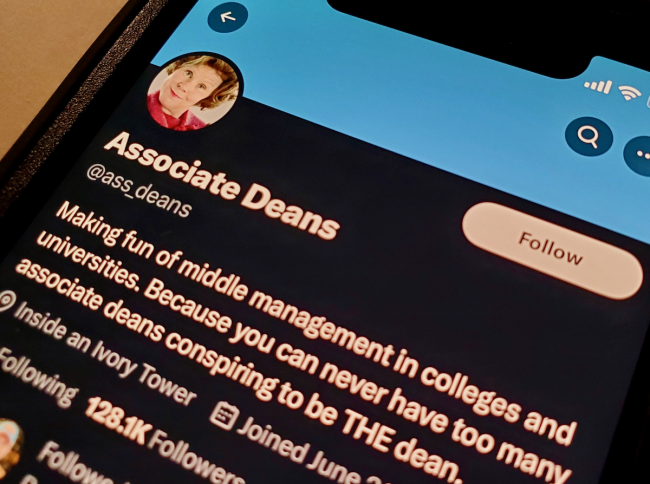You have /5 articles left.
Sign up for a free account or log in.

David Ho/Inside Higher Ed
Twitter, which has helped sustain the Arab Spring and Black Lives Matter movements as well as Russian propaganda and racism, also boasts a user called Associate Deans (@ass_deans). They are situated “Inside an Ivory Tower” and have more than 128,000 followers, which equals about 11.5 percent of all current full- and part-time postsecondary teachers at American colleges and universities. Since 2014, they have gained notoriety by “Making fun of middle management in colleges and universities. Because you can never have too many associate deans conspiring to be THE dean.”
Associate Deans is successful among the Twitterati because they critique administrative bloat, “a hulking nebulous structure of executives … bureaucrats and functionaries” blamed for consuming “roughly half of all payroll expenses at the average non-profit college or university.” Associate Deans believes there are “too many” of these bureaucrats, and that their sole goal in life is to become “THE dean.”
How does Associate Deans parody these ambition-driven functionaries? By assigning their twitter persona a top-memed picture of actress Imelda Staunton in her role as Dolores Umbridge, the most despised character of the Harry Potter transmedia enterprise. Umbridge’s habitual rictus and obsequious managing up help her advance to become headmistress of Hogwarts and under secretary at the Ministry of Magic. Stephen King, who knows all about creating baddies, believes that “her girlish voice, toadlike face, and clutching, stubby fingers” make Umbridge “the greatest make-believe villain to come along since Hannibal Lecter … We turn the pages partly in fervent hopes that she will get her comeuppance.”
What do associate deans do to deserve their comeuppance? Here are some tweets from May 2023:
- May 25: “Yes, we want you to recruit the very best faculty in the country to work at a college with below median pay and in a state where the state legislature is trying to kill tenure. And your negativity isn’t helping!”
- May 11: “Crisis averted! We convinced our regents and state legislature that our DEI efforts were completely ineffective and only really served as window dressing. We can continue as before!”
- May 11: “Don’t agonize over your grading, I am going to change your grades anyway.”
- May 9: “This month’s meeting will be on zoom because I am working remotely. Last month, I was on-campus but you were working remotely so we met in-person. We just can’t accommodate every request for a virtual meeting. What about this is hard to understand?”
- May 7: “We aren’t just not paying your health insurance over the summer, we boxed up your stuff, set the boxes in the hallway, changed the locks on your office door, and moved a post-doc into your office.”
- May 5: “We heard your complaints that we are unresponsive to faculty concerns. We’ll hold a listening session the week after graduation. Can’t wait to open up this dialogue so you feel heard!”
On the outside, readers will notice many of the rhetorical devices orchestrating an immediate humoristic effect: hyperbole, understatement, wordplay, incongruity, inversion, surprise and so on. Behind those devices, however, one suspects the voices of faculty who feel disenchanted, excluded and subject to the whims of midlevel administrators who superintend, badger and torment them. And while the energy at the origin of the tweets suggests that these are keenly felt perceptions, I have only ever met two associate deans (out of about 25) who resemble such negative descriptions. All others worked hard to fulfill indispensable roles in managing academic affairs, research, administration and finance, and faculty affairs (recently also diversity, equity and inclusion), and their professional ethos was all about building and sustaining the conditions in which faculty and students can thrive.
I am switching pronouns now to speak fully on behalf of associate deans: we advise about hiring, promotion and retention; support strategic planning; represent the college to various constituencies; serve as conduits of information across campus; and free the dean for tasks only the dean can do. Far from the inert functionaries @ass_deans lampoons, we are experienced former under-/graduate directors, associate chairs, chairs or simply productive midcareer and senior faculty, ready to apply our skills to serving others.
We engage in administration because (as Patricia Ann Mabrouk has pointed out) we enjoy “team building, creating buy-in and working through chairs, faculty members, administrators and others to execute [our] and [our] dean’s vision.” In addition, we accept that ours is “a 24-hours-a-day, 365-days-a-year commitment. Crises frequently arise and happen when you least expect—after normal work hours and on weekends and federal holidays.” And often conflict resolution is our business, too.
However, even if we diligently perform all this work, it seems we fail at communicating its value to our colleagues. Otherwise, why would Associate Deans be so popular?
Here’s a reality check on the tweets quoted above:
- Associate deans won’t give up on hiring the best faculty, even in adverse conditions, because we owe that to our students and institution.
- We will continue to create the most diverse and just college we can, despite political pressure.
- We will ask for grade changes, but only if a faculty member has violated their own published grading policy.
- We do not determine meeting modes based on personal convenience.
- We can’t change our state’s health insurance laws, but that doesn’t mean we enjoy following them.
- And listening sessions after the end of the semester are nonsensical, although I wonder why anyone might assume their work ends with grade submission when they receive a salary for the entire month?
I am sure @ass_deans will take "umbridge" with these declarations. Should I perhaps create my own Twitter address, something like @ass_profs, and fill it with pithy parodies of faculty behavior (including my own)? Then again, I may not, because I just received a request from a colleague to meet, preferably in person, on Tuesday midafternoon, and in a café close to their apartment, to discuss their materials for promotion.








